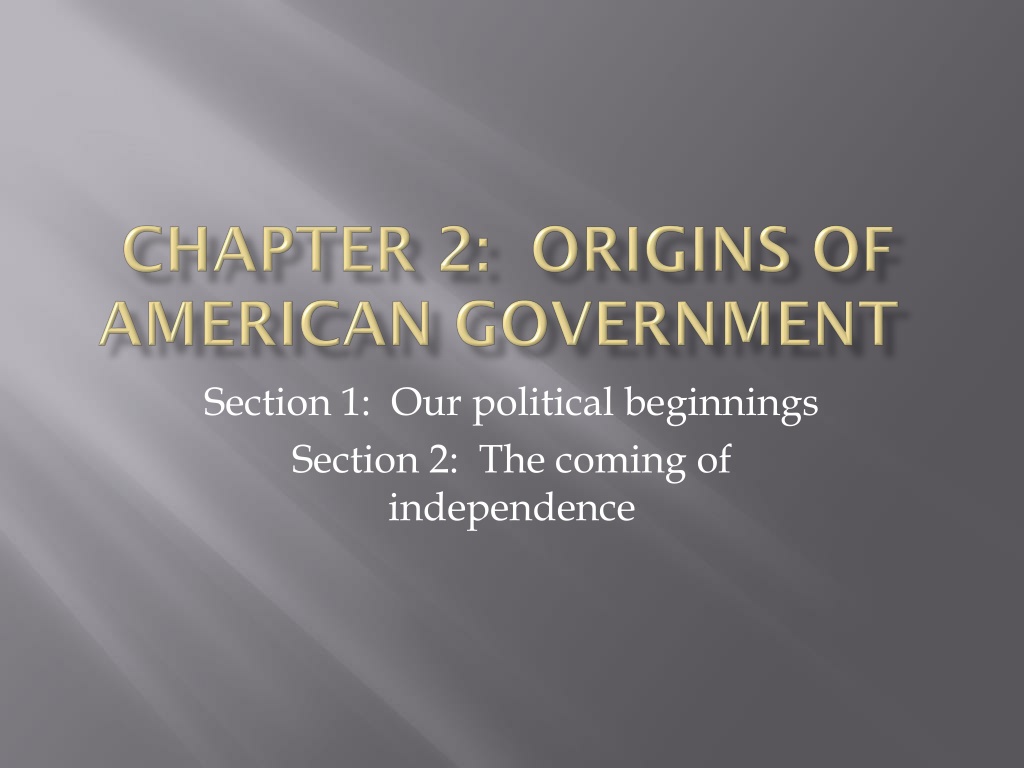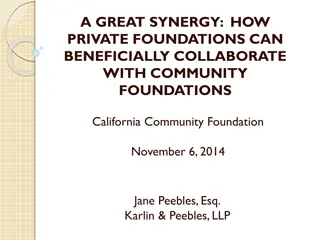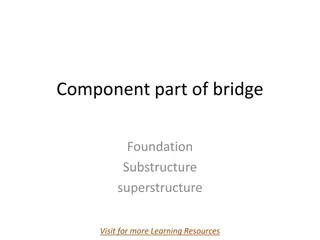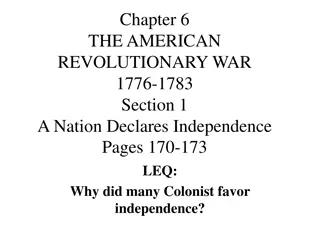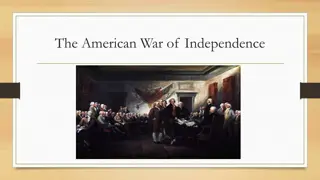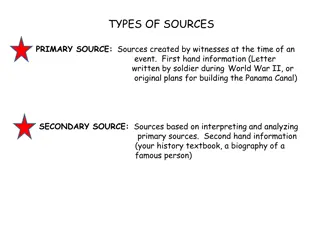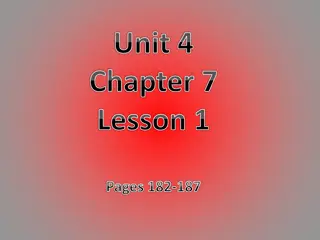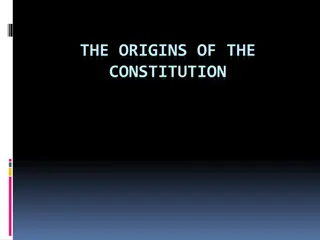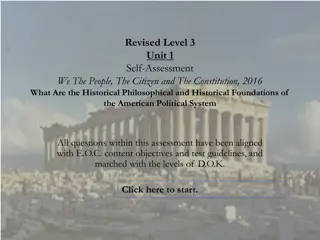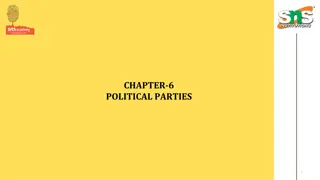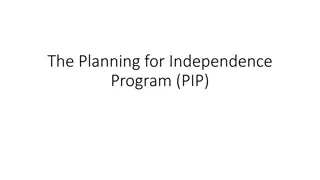Foundations of American Governance: From Our Political Beginnings to Independence
Explore the evolution of political systems in America, from the establishment of ordered and limited government to the assertion of individual rights through key historical documents such as the Magna Carta, Petition of Rights, and English Bill of Rights. Discover the formation of representative government and the development of diverse colonial systems, leading to the road to independence.
Download Presentation

Please find below an Image/Link to download the presentation.
The content on the website is provided AS IS for your information and personal use only. It may not be sold, licensed, or shared on other websites without obtaining consent from the author. Download presentation by click this link. If you encounter any issues during the download, it is possible that the publisher has removed the file from their server.
E N D
Presentation Transcript
Section 1: Our political beginnings Section 2: The coming of independence
Our Political Beginnings
Ordered Government colonists saw a need for an orderly regulation of their relationships with one another. (they needed a government) Many offices established still exist today: sheriff, justice of the peace, & the grand jury. Limited Government government is restricted in what they do and every individual has certain rights that government cannot take away. Representative Government the idea that government should serve the will of the people. Government of, by, and for the people
Magna Carta A.K.A. the Great Charter included guarantees of fundamental rights such as trial by jury and due process (protection against the arbitrary taking of life, liberty, or property). Originally intended for the privileged class only. Established the critical idea that the monarchy s power was not absolute.
Petition of Rights limited the kings power in several ways. Demanded that the king no longer imprison or punish any person without judgment by his peers or by the law of the land. Insisted that the king may not impose martial law (military rule) in times of peace Does not require homeowners to shelter the king s troops without their consent. Declared that no man should be required to give any gift, loan, tax, or any like charge without consent or by act of Parliament. Said that even a king must obey the law of the land
English Bill of Rights coincided with the Glorious Revolution associated with William and Mary of Orange. Prohibited a standing army in peace time, except with the consent of Parliament. Included guarantees such as the right to a fair trial and freedom from excessive bail and cruel and unusual punishment.
A.K.A. the 13 schools of government Established over a span of 125 years 1stcolony: Virginia (1stpermanent settlement: Jamestown in 1607 Last colony: Georgia (Savannah 1733) 3 different types of colonies existed: royal, proprietary, and charter.
New Hampshire, Massachusetts, New York, New Jersey, Virginia, North Carolina, South Carolina, and Georgia. 1stroyal colony: Virginia Led by royal governors who took orders from Britain and ruled with a stern hand and caused much tension and resentment. Bicameral legislature (2 houses)
Maryland, Pennsylvania, and Delaware. Land given to a person by the King. Maryland: Lord Baltimore (1632) haven for Catholics Pennsylvania (1681) & Delaware (1682) William Penn Unicameral legislature (1 house)
Massachusetts Bay Colony, Connecticut, and Rhode Island Massachusetts Bay Colony: 1stcharter colony established in 1629. Connecticut established in 1633 Rhode Island established in 1636 Laws made by their bicameral legislatures were not subject to the governor s veto, nor was the Crown s approval needed.
The Coming of Independence
13 colonies were separately controlled under the king through the Privy Council and the Board of Trade in London. Due to the vast distance however between London and the colonies the colonies became used to a large amount of self government and they began to assume broad lawmaking powers. By the mid 1700s the relationship between Britain and the colonies became federal which meant that the central government in London was responsible for colonial defense, foreign affairs, a uniform system of money and credit, and a common market for colonial trade. This meant the colonies had a wide amount of self-rule.
Early attempts: 1643 Massachusetts Bay, Plymouth, New Haven, & Connecticut settlements founded the League of Friendship for defense against Native Americans. This was known as a confederation. Confederation a joining of several groups for a common purpose.
1754 Benjamin Franklin Called for an annual meeting of delegates from the 13 colonies and they would have the power to raise a military and naval force, make war and peace with the Native Americans, regulate trade with the Native Americans, and tax and collect customs duties.
1765 Required the use of tax stamps on all legal documents, on certain business agreements, and on newspapers. Participants: All colonies except Georgia, New Hampshire, North Carolina, & Virginia. Took place in New York Prepared a protest entitled the Declaration of Rights and Grievances and sent it to the King Marked the first time a significant number of colonies had banded together to oppose the British government Repealed by Parliament Cause of Boston Massacre on March 5, 1770 Cause of Boston Tea Party on December 16, 1773
Spring of 1774 Philadelphia Delegates from all colonies except Georgia In response to the Intolerable Acts which were passed by Parliament in response to the problems in Boston and elsewhere. Result: Declaration of Rights was sent to King George protesting Britain s colonial policies. Urged colonies to refuse all trade with England and to ignore all taxes and trade regulations until the Intolerable Acts were repealed.
May 10, 1775 Philadelphia Each of the 13 colonies sent delegates John Hancock was chosen as President of the Congress Created a continental army and appointed George Washington as Commander-in-Chief Occurred because the British government began to hand down even stricter punishments and regulations to the colonies as a result of the 1st Continental Congress
The 2nd Continental Congress became our first national government for 5 years from July 1776 until the Articles of Confederation came about on March 1, 1781 Unicameral legislature (exercised both executive and legislative powers) During its time it did the following: fought a war, raised an army and navy, borrowed funds, bought supplies, created a money system, and made treaties with foreign powers.
Worked off of the notion of the consent of the governed Went against divine right and tradition. Said people were created equal and were endowed with certain unalienable rights Said that people should rule, not be ruled. When adopted the United States of America was born and the 13 colonies became free and independent states.
1ststate: New Hampshire January 1776 (replaced royal charter) State constitutions = written bodies of fundamental laws setting out the principles, structures, and processes of their governments. Massachusetts constitution of 1780 is the oldest of the present day constitutions, and the oldest written constitution in force today. Common features: popular sovereignty (a government that exists with the consent of the governed), limited government, civil rights and liberties, separation of powers, and checks and balances.
Limited Government - State governments could exercise only those powers granted to them by the people through the constitution. Civil Rights & Liberties - Sovereign people held certain rights that the government must respect at all times. Separation of Powers, Checks & Balances The powers granted to the new state governments were divided among 3 distinct branches (executive, legislative, & judicial) and each branch was given powers to check, or restrain, the other branches of government.
